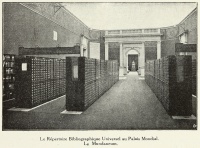Information science
From The Art and Popular Culture Encyclopedia
| Revision as of 11:15, 24 October 2022 Jahsonic (Talk | contribs) ← Previous diff |
Current revision Jahsonic (Talk | contribs) |
||
| Line 1: | Line 1: | ||
| + | [[Image:Mundaneum by Paul Otlet.jpg|thumb|200px|[[Mundaneum]] by [[Paul Otlet]]]] | ||
| + | {| class="toccolours" style="float: left; margin-left: 1em; margin-right: 2em; font-size: 85%; background:#c6dbf7; color:black; width:30em; max-width: 40%;" cellspacing="5" | ||
| + | | style="text-align: left;" | | ||
| + | "The discipline of ''[[documentation science]]'', which marks the earliest theoretical foundations of modern information science, emerged in the late part of the 19th century in Europe together with several more scientific indexes whose purpose was to organize scholarly literature. Many information science historians cite [[Paul Otlet]] and [[Henri La Fontaine]] as the fathers of information science with the founding of the ''[[International Institute of Bibliography]]'' (IIB) in 1895."--Sholem Stein | ||
| + | |} | ||
| {{Template}} | {{Template}} | ||
| Line 20: | Line 25: | ||
| * [[Information technology]] – The use of computers and technology to manage information. | * [[Information technology]] – The use of computers and technology to manage information. | ||
| * [[Enterprise content management]] – Strategies and technologies for managing content, documents and information | * [[Enterprise content management]] – Strategies and technologies for managing content, documents and information | ||
| - | * [[International Federation for Information Processing]] – Global body for informatics. | ||
| - | * [[Research Methods Institute]] - Information science to empower researchers and analysts | ||
| * [[Personal information management|Personal information management (PIM)]] | * [[Personal information management|Personal information management (PIM)]] | ||
| * [[Philosophy of information]] | * [[Philosophy of information]] | ||
Current revision
|
"The discipline of documentation science, which marks the earliest theoretical foundations of modern information science, emerged in the late part of the 19th century in Europe together with several more scientific indexes whose purpose was to organize scholarly literature. Many information science historians cite Paul Otlet and Henri La Fontaine as the fathers of information science with the founding of the International Institute of Bibliography (IIB) in 1895."--Sholem Stein |
|
Related e |
|
Featured: |
Information science (also known as information studies) is an academic field which is primarily concerned with analysis, collection, classification, manipulation, storage, retrieval, movement, dissemination, and protection of information.
Practitioners within and outside the field study the application and the usage of knowledge in organizations in addition to the interaction between people, organizations, and any existing information systems with the aim of creating, replacing, improving, or understanding the information systems.
Historically, information science (informatics) is associated with computer science, data science, psychology, technology, library science, healthcare, and intelligence agencies. However, information science also incorporates aspects of diverse fields such as archival science, cognitive science, commerce, law, linguistics, museology, management, mathematics, philosophy, public policy, and social sciences.
See also
- Computer and information science
- Information technology
- Dewey Decimal Classification
- Paul Otlet
- Classification
- Archive
- Librarian
- Imaginary library
See also
- Informatics
- Information technology – The use of computers and technology to manage information.
- Enterprise content management – Strategies and technologies for managing content, documents and information
- Personal information management (PIM)
- Philosophy of information
- Informative modelling


